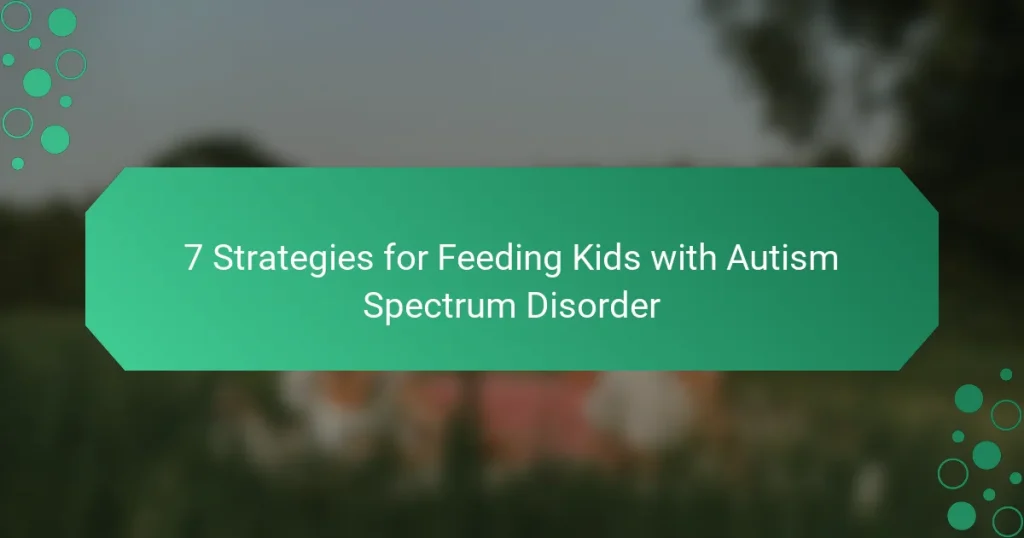Nutrition and wellness are vital for all children, especially those with special dietary needs. Tailoring a balanced diet that accommodates specific restrictions can help ensure they receive essential nutrients for healthy growth and development. By focusing on a variety of food groups and consulting with professionals, parents can create effective meal plans that support their child's unique requirements.
What Are the Best Nutrition Plans for Kids with Special Dietary Needs?
The best nutrition plans for kids with special dietary needs focus on providing balanced, nutrient-rich foods while avoiding allergens or irritants. These plans should be tailored to the child's specific requirements, ensuring they receive adequate vitamins and minerals for growth and development.
Gluten-Free Diet
A gluten-free diet eliminates all sources of gluten, a protein found in wheat, barley, and rye. This diet is essential for children with celiac disease or gluten sensitivity, as consuming gluten can lead to serious health issues.
When implementing a gluten-free diet, focus on naturally gluten-free foods such as fruits, vegetables, meat, fish, and gluten-free grains like rice and quinoa. Always check labels for hidden gluten in processed foods.
Dairy-Free Diet
A dairy-free diet excludes all dairy products, making it necessary for children with lactose intolerance or dairy allergies. This diet can help alleviate digestive issues and allergic reactions associated with dairy consumption.
To ensure adequate calcium intake, include alternatives like fortified plant-based milk (such as almond or soy milk), leafy greens, and fortified juices. Be cautious of hidden dairy in processed foods, and read labels carefully.
Nut-Free Diet
A nut-free diet is crucial for children with nut allergies, which can cause severe allergic reactions. This diet eliminates all nuts, including tree nuts and peanuts, from the child's meals and snacks.
Parents should educate caregivers and teachers about the allergy and ensure that snacks and meals are free from nuts. Always check ingredient lists and consider safe alternatives like seeds or legumes for protein sources.
Plant-Based Diet
A plant-based diet emphasizes fruits, vegetables, whole grains, legumes, nuts, and seeds while minimizing or excluding animal products. This diet can be beneficial for children looking to improve their overall health and reduce the risk of chronic diseases.
When adopting a plant-based diet, ensure that children receive sufficient protein, iron, calcium, and vitamin B12, which can be lower in plant foods. Incorporate a variety of foods to meet their nutritional needs and consider fortified products when necessary.
Low FODMAP Diet
The low FODMAP diet reduces fermentable carbohydrates that can cause digestive discomfort, making it suitable for children with irritable bowel syndrome (IBS). This diet involves eliminating high FODMAP foods for a period before gradually reintroducing them to identify triggers.
Common high FODMAP foods to avoid include certain fruits (like apples and pears), dairy products, and wheat-based products. Focus on low FODMAP options such as bananas, carrots, and gluten-free grains to maintain a balanced diet.
How Can Parents Ensure Balanced Nutrition?
Parents can ensure balanced nutrition for their kids by focusing on a variety of food groups and consulting professionals when necessary. A well-rounded diet includes fruits, vegetables, whole grains, proteins, and healthy fats, tailored to meet any special dietary needs.
Consulting a Pediatric Nutritionist
Consulting a pediatric nutritionist can provide personalized guidance for children's dietary needs, especially for those with allergies or specific health conditions. These professionals can assess nutritional requirements and create meal plans that ensure kids receive essential nutrients.
When seeking a nutritionist, look for credentials such as Registered Dietitian Nutritionist (RDN) and experience in pediatric care. This ensures that the advice is both credible and relevant to children's health.
Using Meal Planning Apps
Meal planning apps can simplify the process of ensuring balanced nutrition by helping parents organize meals and track nutrient intake. Many apps allow users to input dietary restrictions and generate recipes that meet those needs.
Popular options include MyFitnessPal and Yummly, which offer features like grocery lists and meal reminders. Utilizing these tools can help parents stay on track and make informed food choices for their children.
Incorporating Whole Foods
Incorporating whole foods into children's diets is crucial for optimal nutrition. Whole foods, such as fruits, vegetables, nuts, and whole grains, are rich in vitamins, minerals, and fiber, which support overall health and development.
To encourage whole food consumption, parents can involve kids in cooking and selecting ingredients. Simple strategies include preparing snacks like apple slices with nut butter or whole grain toast topped with avocado, making healthy eating enjoyable and accessible.
What Are Common Dietary Restrictions for Kids?
Common dietary restrictions for kids include food allergies, intolerances, and chronic conditions that necessitate specific dietary management. Understanding these restrictions is crucial for parents and caregivers to ensure proper nutrition and health.
Food Allergies
Food allergies occur when the immune system mistakenly identifies a harmless food protein as a threat, leading to potentially severe reactions. Common allergens include peanuts, tree nuts, milk, eggs, soy, wheat, fish, and shellfish.
Parents should read labels carefully and avoid cross-contamination during food preparation. It’s essential to have an emergency plan, including access to antihistamines or epinephrine auto-injectors, if prescribed.
Intolerances
Food intolerances are non-immune reactions to certain foods, often resulting in digestive issues. Lactose intolerance and gluten sensitivity are two prevalent examples among children.
Managing intolerances typically involves avoiding specific foods. For lactose intolerance, alternatives like lactose-free milk can be beneficial, while gluten-free grains such as rice and quinoa can replace wheat products for those with gluten sensitivity.
Chronic Conditions
Chronic conditions such as diabetes, celiac disease, or obesity require tailored dietary approaches to manage health effectively. For instance, children with diabetes need to monitor carbohydrate intake to maintain stable blood sugar levels.
Consulting with a healthcare provider or a registered dietitian can help create a balanced meal plan that meets the child’s nutritional needs while accommodating their condition. Regular monitoring and education about food choices are vital for long-term success.
How to Identify Nutritional Deficiencies?
Identifying nutritional deficiencies in kids involves recognizing signs and symptoms, as well as conducting regular assessments. Parents and caregivers should be vigilant about changes in behavior, growth patterns, and overall health, which may indicate a lack of essential nutrients.
Regular Health Check-ups
Regular health check-ups are crucial for monitoring a child's growth and development. During these visits, healthcare providers assess dietary habits and can identify potential deficiencies through physical examinations and discussions about nutrition.
It is recommended that children have annual check-ups, which can help catch any issues early. Keeping a record of growth metrics, such as height and weight, can also provide insights into nutritional status.
Blood Tests for Nutrients
Blood tests can provide definitive information about a child's nutritional status by measuring levels of key nutrients. Common tests include those for iron, vitamin D, and vitamin B12, which are vital for growth and development.
Parents should consult with healthcare providers to determine the appropriate timing and necessity of these tests, especially if there are concerns about a child's diet. Regular testing may be particularly important for children with specific dietary restrictions or health conditions.
What Resources Are Available for Parents?
Parents of children with special dietary needs have access to various resources that can provide support and information. These resources include support groups, online communities, and educational websites that cater specifically to dietary challenges.
Support Groups
Support groups offer a space for parents to connect, share experiences, and exchange advice regarding their children's dietary needs. These groups can be found locally or online, providing a sense of community and understanding.
Many support groups organize regular meetings, workshops, or events that focus on specific dietary issues, such as food allergies or intolerances. Participating in these gatherings can help parents feel less isolated and more empowered in managing their child's nutrition.
Online Communities
Online communities serve as platforms for parents to discuss their children's special dietary needs with others who face similar challenges. Websites and social media groups allow for real-time sharing of tips, recipes, and resources.
These communities often feature forums or discussion boards where parents can ask questions and receive feedback from others. Engaging in these online spaces can provide valuable insights and foster connections with other families navigating similar dietary concerns.
Educational Websites
Educational websites dedicated to children's nutrition and wellness offer a wealth of information for parents. These sites typically cover topics such as meal planning, dietary restrictions, and nutritional guidelines tailored for children with special needs.
Many reputable organizations provide resources that include articles, videos, and downloadable guides. Parents can benefit from these materials by gaining knowledge on how to effectively support their child's dietary requirements while ensuring balanced nutrition.






